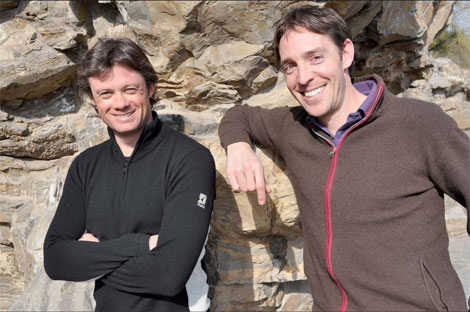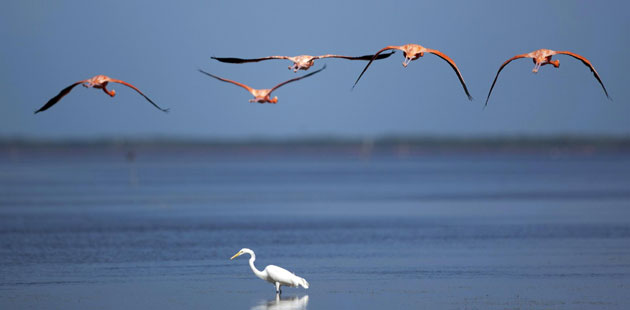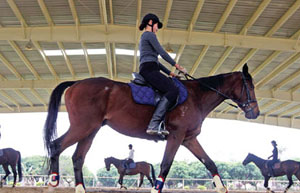Yak-to-back success
Updated: 2011-12-16 07:47
By Mark Graham (China Daily)
|
|||||||||
|
Former army officer Julian Wilson (left) and one-time American aid worker Aaron Pattillo founded a company that makes sportswear with yak hair. Provided to China Daily |
Yak hair is the unlikely material for sportswear made by two China-based entrepreneurs
The main players in an unlikely new China upmarket clothing venture include yaks from the Tibetan Plateau, a British ex-army officer, a former American aid worker and the sole member of the Ghanian ski team.
The disparate cast of characters are all linked to Khunu, a company formed with the ambitious intention of popularizing yak-hair adventure garments made from the hardy beast's wool. The first task of the principals in the company, former army officer Julian Wilson and one-time American aid worker Aaron Pattillo, was to try to dispel the generally held belief that yak hair clothing would be thick and itchy, not the kind of garment you would immediately think of shelling out $120 (89 euros) for.
Their tests so far, both theoretical and practical, have shown that wool from the hefty Tibetan Plateau animals is significantly warmer than lamb wool and - more importantly - softer than the much-prized cashmere sourced from the same remote areas.
Based on those findings, the pair have launched the Khunu label, producing China-made sweaters that are designed to appeal to discerning adventure lovers.
Icebreaker, a New Zealand company, has had major success in selling fine-weave merino ski, hiking and running gear. The Beijing-based entrepreneurs are hoping that Khunu will have similar success with its yak-hair garments.
The products certainly had a memorable launch. During the Winter Olympics in Vancouver last year, the company provided the kit for skier Kwame Nkrumah-Acheampong, known to his fans as the Snow Leopard, who became the first Ghanaian to compete in the Winter Games. Nkrumah-Acheampong garnered plenty of media attention, including publicity for his yak-hair-garment sponsors.
Khunu's longer-term marketing plan is not based on such one-off gimmicks, but on the quality, comfort and durability of yak hair, along with its pledge to donate 2 percent of the profits back to the yak-herding communities that roam along the Sichuan-Tibet border in the remote western region of China. The founders of the company both adventure-loving type, who first met on a Beijing mountain-biking expedition, had long been looking for a business venture aligned with their concerns for the plight of poorer rural communities.
"We had been to the west part of China, where yaks come from, and realized that the community there has one commodity - a yak," says Wilson, 40, who has served in Bosnia and Northern Ireland.
"We discovered that coarse fiber from the yaks was being used for ropes and tents but the soft fiber wasn't being used at all. It was just falling off the animal and blowing away in the wind.
"On a very simplistic level, we thought here is a wool that keeps animals warm at 4,500 meters during the winter in pretty tough conditions... Can we make something out of it? Broadly speaking we are taking the wool and make it into clothing that is great to wear in cold-weather climates."
Having established a demand for the product, the pair began to set up a workable supply chain, no mean feat given that the herders are nomadic by nature. The plan is to target community leaders to spread the message that there is a market for the softer, usually discarded yak wool.
"There is an opportunity for the herders to make more out of the yak, to have an additional source of income," Wilson says.
"We need to make sure it is a transparent market, so we understand where wool comes from and what price is being paid to the herders. That is one of the objectives of the business. Although it is often a huge challenge, we are getting a lot of satisfaction from doing what we are doing."
Co-founder Pattillo, 34, recently undertook a promotional tour of the United States, visiting high-end sports and adventure stores, where feedback was extremely positive.
"The retailers said great, they loved the product and the story behind it," says Pattillo, who originally came to China working with the Clinton Foundation charity. "With yak hair there is such a difference between what they expect and what they are touching and feeling. It is neat to have that surprise and enthusiastic response and even surprise and disbelief.
"Where we source the wool is an extreme region, with hardy people, and people overseas are interested in that. We show images of the yak, and people really see that connection.
"For a long time we wondered if this business was too crazy, or offbeat, or if there was a reason that we hadn't stumbled upon why people had not done this before. But now we have the products, there is a lot of interest."












